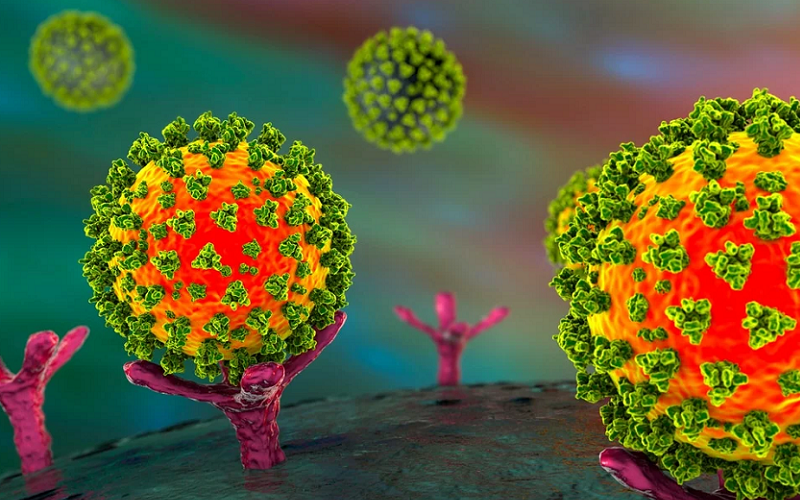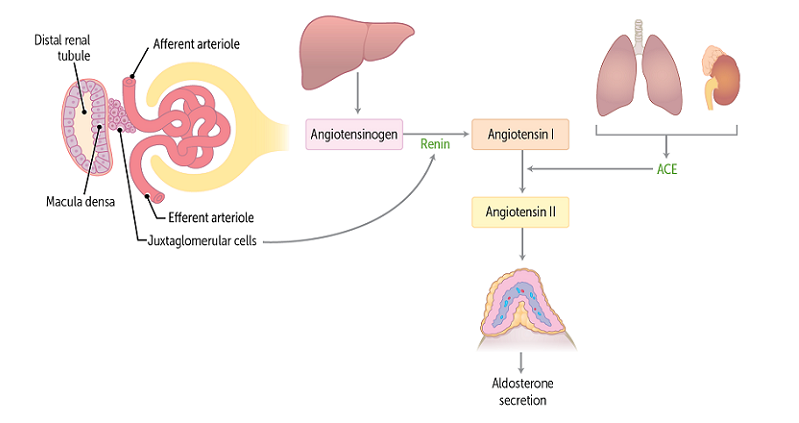
The Renin-Angiotensin System (RAS) is often recognized for its pivotal role in regulating blood pressure and electrolyte balance. However, recent advancements in neuroscience and endocrinology have unveiled a fascinating new dimension to this system: its profound impact on cognitive functions. From its traditional role in controlling blood pressure to its emerging significance in memory, learning, and mental health, the RAS presents a complex yet captivating narrative.
Contents
- Introduction to Renin-Angiotensin System (RAS)
- The Basic Science of the Renin-Angiotensin System (RAS)
- Renin-Angiotensin System (RAS) and the Brain: An Overview
- Cognitive Implications of the Renin-Angiotensin System (RAS)
- References
Introduction to Renin-Angiotensin System (RAS)
The Renin-Angiotensin System (RAS), a cornerstone in the field of cardiovascular physiology, is well-known for its role in regulating blood pressure and fluid balance. Yet, recent explorations have unearthed a lesser-known facet of this system – its profound impact on cognitive functions. This intriguing connection between the RAS and brain health marks a significant leap in our understanding of hormonal influence on cognitive processes.
Explanation of the Renin-Angiotensin System (RAS)
The Renin-Angiotensin System is an intricate hormonal cascade primarily involved in controlling blood pressure and electrolyte balance. It starts with the release of renin, an enzyme, which plays a pivotal role in converting angiotensinogen to angiotensin I. This is further converted to angiotensin II, a potent vasoconstrictor, via the angiotensin-converting enzyme (ACE). This system’s ability to regulate blood volume and vascular resistance is critical for maintaining cardiovascular homeostasis.
Overview of the Renin-Angiotensin System (RAS) Traditional Role in Blood Pressure Regulation
Traditionally, the RAS has been a focal point in understanding and treating conditions like hypertension and heart failure. Its regulatory mechanisms, involving complex interactions between kidneys, blood vessels, and the heart, are integral in maintaining blood pressure within a normal range. The system’s ability to respond to changes in blood pressure and electrolyte levels exemplifies its vital role in cardiovascular health.
Introduction to the Emerging Research on RAS and Cognitive Functions
Recent research has shifted the spotlight to a novel aspect of the RAS – its involvement in cognitive functions. This emerging area of study explores how components of the RAS, particularly angiotensin II, interact with various brain regions, influencing processes such as memory, learning, and emotional regulation. The implications of these findings are profound, suggesting potential therapeutic avenues for neurodegenerative diseases and mental health disorders, thereby redefining our understanding of the RAS beyond its cardiovascular domain [1].

The Basic Science of the Renin-Angiotensin System (RAS)
To fully grasp the cognitive implications of the Renin-Angiotensin System (RAS), it is essential to first understand its basic science.
Components and Functioning of the RAS
The RAS is a sophisticated hormonal system comprising several components that work in concert to maintain cardiovascular homeostasis. The system’s journey begins in the kidneys with the release of renin, an enzyme that responds to changes in blood pressure and electrolyte levels. Renin catalyzes the conversion of angiotensinogen, a liver-produced protein, into angiotensin I. This inactive form is then converted into angiotensin II, the system’s most active component, by the angiotensin-converting enzyme (ACE), primarily found in the lungs.
Angiotensin II: The Key Hormone and Its Effects
Angiotensin II, the pivotal hormone in the RAS, has multifaceted roles. It is a potent vasoconstrictor, meaning it can constrict blood vessels, thereby increasing blood pressure. Additionally, it stimulates the secretion of aldosterone from the adrenal glands, leading to sodium and water retention, further influencing blood pressure. Beyond these well-known roles, angiotensin II has various effects on different organ systems, including the brain, which are pivotal to understanding its cognitive connections.
The Role of Renin: Triggering the System
Renin’s primary role is to initiate the cascade of reactions that form the RAS. Its release is triggered by factors such as reduced blood pressure, decreased sodium concentration in the kidneys, or sympathetic nervous system activation. As the first step in the RAS pathway, renin’s activity is crucial for the system’s functioning, influencing the subsequent production of angiotensin II and the overall impact on both cardiovascular and cognitive health [2].
Renin-Angiotensin System (RAS) and the Brain: An Overview
While the Renin-Angiotensin System (RAS) is primarily known for its role in cardiovascular regulation, its influence extends into the brain, opening a new chapter in our understanding of cognitive health.
Blood-Brain Barrier and RAS Interaction
The blood-brain barrier, a selective permeability barrier, plays a crucial role in regulating the entry of substances from the bloodstream into the brain. While components of the RAS are largely systemic, evidence suggests that the brain possesses its own local RAS. This localized system is believed to function independently of the peripheral RAS, impacting various brain functions. The angiotensin receptors located in different brain regions further emphasize the direct influence of the RAS on the brain.
Angiotensin Receptors in the Brain
Angiotensin II, the primary effector hormone of the RAS, exerts its influence in the brain through specific receptors, primarily AT1 and AT2 receptors. These receptors are distributed in various brain regions, including those involved in memory and emotional processing, such as the hippocampus and amygdala. The activation of these receptors by angiotensin II can lead to diverse effects, ranging from influencing cerebral blood flow to modulating neuronal activity [3].
Physiological Effects of RAS on Brain Function
The interaction between the RAS and the brain is not limited to blood pressure regulation but extends to influencing cognitive functions. Angiotensin II has been shown to impact learning and memory processes, possibly through its effects on synaptic plasticity and neuronal excitability. Additionally, the RAS in the brain is thought to play a role in the regulation of stress responses and mood, contributing to our understanding of various psychiatric and neurodegenerative disorders.

Cognitive Implications of the Renin-Angiotensin System (RAS)
The cognitive implications of the Renin-Angiotensin System (RAS) are as diverse as they are significant. This section explores the impact of the RAS on various cognitive aspects, including memory, learning, neurodegenerative diseases, and mental health, providing insights into how this hormonal system could be pivotal in understanding and potentially treating cognitive disorders.
RAS and Memory and Learning
Role of Angiotensin II in Memory Formation
Angiotensin II, a key hormone in the RAS, plays a notable role in memory and learning. It interacts with brain receptors that are crucial for cognitive processes. Research suggests that angiotensin II can influence synaptic plasticity – the ability of synapses to strengthen or weaken over time, which is essential for learning and memory formation. There is evidence that angiotensin II may enhance certain types of memory, potentially offering avenues for cognitive enhancement therapies [4].
Studies on RAS Inhibitors and Cognitive Enhancement
The use of RAS inhibitors, such as ACE inhibitors and angiotensin receptor blockers, has been studied for their potential cognitive benefits. Some research indicates that these medications may have a protective effect on cognitive functions, possibly by improving cerebral blood flow or reducing inflammation. These findings open up potential therapeutic uses of RAS inhibitors in cognitive impairments and underscore the need for further research in this area.
RAS and Neurodegenerative Diseases
RAS and Alzheimer’s Disease
There is growing interest in the relationship between the RAS and Alzheimer’s disease. Angiotensin II’s effects on inflammation and blood flow could influence the progression of Alzheimer’s, particularly in its early stages. Some studies suggest that RAS modulation may have a therapeutic role, potentially slowing the progression of neurodegenerative processes.
Potential Therapeutic Applications
The potential therapeutic applications of targeting the RAS in neurodegenerative diseases extend beyond Alzheimer’s. By modulating the RAS, it might be possible to influence the underlying pathological processes of various neurodegenerative disorders, offering a novel approach to treatment [5].
RAS and Mood Regulation and Mental Health
RAS and Depression
The RAS may also play a role in mood regulation and the pathophysiology of depression. Angiotensin II can influence stress hormone levels and affect brain regions involved in mood regulation. Understanding the RAS’s role in depression could lead to new strategies for managing mental health disorders.
Angiotensin Receptors and Stress Response
The impact of angiotensin receptors on the body’s stress response further highlights the RAS’s role in mental health. These receptors’ activation in the brain can affect how the body responds to stress, potentially influencing the development or progression of stress-related disorders.
References
[1] Within the Brain: The Renin Angiotensin System
[2] Brain Renin–Angiotensin System at the Intersect of Physical and Cognitive Frailty
[3] How Is the Brain Renin–Angiotensin System Regulated?
[4] Renin Angiotensin System in Cognitive Function and Dementia
[5] A colorful view of the brain renin–angiotensin system

